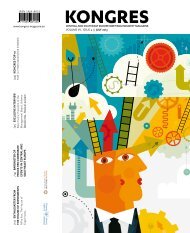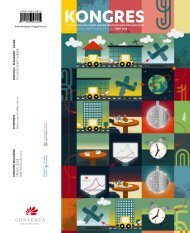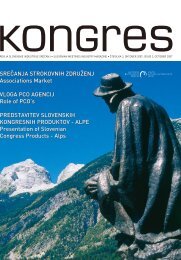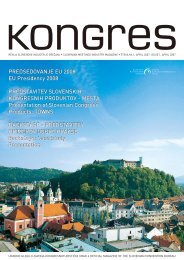EIBTM 2008 Industry Trends & Market Share Report - HCB
EIBTM 2008 Industry Trends & Market Share Report - HCB
EIBTM 2008 Industry Trends & Market Share Report - HCB
You also want an ePaper? Increase the reach of your titles
YUMPU automatically turns print PDFs into web optimized ePapers that Google loves.
Learners who use these technologies every day expect technology to be seamlessly<br />
interwoven into learning situations, i.e., meetings’.<br />
* Effective design of meetings and events programmes, for Generation Y: People in<br />
this demographic segment want:<br />
- More involvement at the design stage.<br />
Generation Y is an interactive generation that is used to being consulted for feedback<br />
on almost everything that affects them. As a result, they are used to interacting with<br />
service providers of all kinds. Meetings and events planners targeting this age group<br />
are advised to involve them, from the earliest stage, in the design of the programme,<br />
choice of activities, and even the selection of speakers, so that they feel a sense of<br />
‘ownership’ of these events.<br />
- More attention given to Corporate Social Responsibility and environmental issues<br />
A greater concern for CSR and the need to have some interaction with the local<br />
community at the meeting/event destination are two of the most distinguishing<br />
characteristics of Generation Y. Arguably, much of the impetus towards ‘greener’<br />
meetings and events is being driven by this youngest generation of participants, who<br />
are far less tolerant of waste and the negative impacts of such events on the natural<br />
environment. They also appear to care more about the human environment, and are<br />
uneasy about the apparent elitist aspect of many business events, particularly when<br />
these take place in destinations marked by widespread poverty and disadvantaged<br />
residents. Progressive meetings and events planners can respond to these concerns<br />
by giving their participants the opportunity to take time out to interact with the local<br />
community during the event and to ‘give something back’ – by, for example, raising<br />
funds for a local charity or playing football with the local children.<br />
Such activities hold great appeal for Y-ers, who regard them as an ethically-sound<br />
antidote to the conspicuous consumption and elitism that can characterise business<br />
events.<br />
- More effective use of speakers<br />
It is often said that Y-ers’ short attention spans make them a difficult audience at<br />
any meeting. But all of the psychological research indicates that for delegates of any<br />
age, attention levels drop dramatically after the first 20 minutes of any presentation.<br />
The drive towards shorter, more interactive sessions will intensify as Y-ers account<br />
for an increasingly large proportion of participants in business events. Generation Y<br />
participants expect interaction, in real time, with each other and with speakers,<br />
through having the opportunity, for example, to text-message their questions to a<br />
big screen during sessions.<br />
What do they expect from speakers? Fishman believes that they want:<br />
* Substantive information that can help them advance in their current jobs or<br />
become better prepared when they move on. Motivational speakers don’t motivate<br />
them.<br />
10








